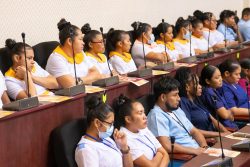Dear Editor,
In a fascinating lecture sponsored by the Caribbean Development Bank, Professor Mariana Mazzucato made the case for purpose-driven co-operation between an efficient public sector and an efficient private sector. She contends that such cooperation is the most effective way for countries to grow their economies and achieve sustainable development goals. What is needed are carefully thought-out strategies, devised jointly by public and private sector agencies, fully and publicly articulated, and aimed to achieve specific missions. Professor Mazzucato provided examples of purpose-driven public-private collaborations, ranging from the successful NASA mission to land men on the moon in the 1960s, to recent export successes of the German steel industry and the French automobile parts industry.
Professor Mazzucato uses lessons from effective responses to the Covid-19 pandemic to demonstrate her point. The most successful strategies are emerging in countries that have demonstrated a capacity to learn from experience and adapt to favour policies that produce desired results. These public policies answered to the needs of citizens, in this case for protection and restoration of livelihoods, while simultaneously reducing health risks and rooting out Covid-19. The public policies also encouraged private companies to produce goods and provide services in ways that are sustainable and resilient in case of future pandemics. Also crucially important were public policies governing the production and use of data, and the operations of digital platforms.
Governments which have done well are those where public decisions on shut-downs, border closures and other policies were designed and implemented jointly by health authorities, other public officials and private business institutions and health practitioners. The collaborative decision process was one in which the protagonists embraced the reality that there were no certain outcomes, and built coping strategies to deal with uncertainty. The decision teams targetted those private initiatives which were started by enthusiasts and which, in their judgement, were directed to the mission, in this case reducing the loss of life and morbidity, while restoring economic activity and social interaction. The initiatives favoured were those that built the capacity of health systems to manage the pandemic, and the systems and protocols needed to address future pandemics. Another important consideration was the impact of Covid-related measures on the environment, on the use of information technologies and other spillovers.
Professor Mazzucato’s important work, which came to widespread attention with the publication of her 2013 book The Entrepreneurial State, brings to the fore the importance of the role of the state in economic growth. Far from being a passive regulator, the state needs to be an active partner with private sector agencies and interests, with a shared mission and goals. In her Caribbean Development Bank lecture, Professor Mazzucato used recent experiences, including Covid-19 responses, to expand on the capacity and capabilities with which Government has to be endowed, to play its role effectively. What remains is for Caribbean countries to compare these requirements with the current capacity and capabilities of our Governments and to take action to bring them up to the required levels of performance.
Yours faithfully,
R. DeLisle Worrell, Ph D
International Economic Consultant








